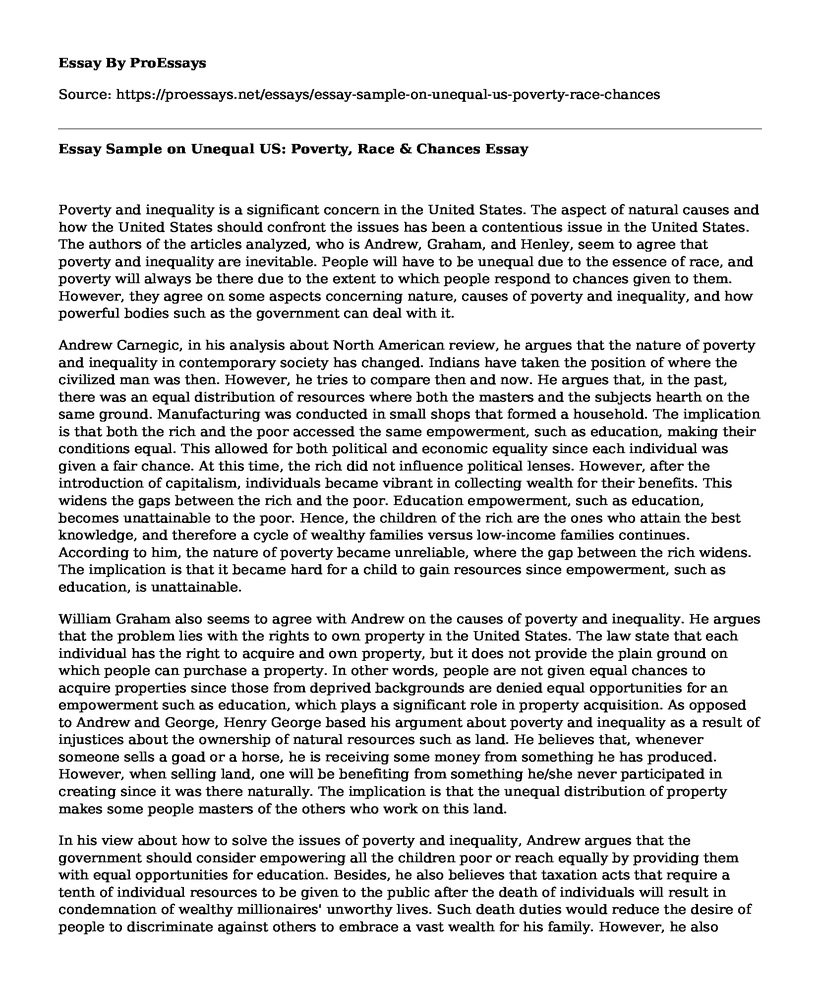Poverty and inequality is a significant concern in the United States. The aspect of natural causes and how the United States should confront the issues has been a contentious issue in the United States. The authors of the articles analyzed, who is Andrew, Graham, and Henley, seem to agree that poverty and inequality are inevitable. People will have to be unequal due to the essence of race, and poverty will always be there due to the extent to which people respond to chances given to them. However, they agree on some aspects concerning nature, causes of poverty and inequality, and how powerful bodies such as the government can deal with it.
Andrew Carnegic, in his analysis about North American review, he argues that the nature of poverty and inequality in contemporary society has changed. Indians have taken the position of where the civilized man was then. However, he tries to compare then and now. He argues that, in the past, there was an equal distribution of resources where both the masters and the subjects hearth on the same ground. Manufacturing was conducted in small shops that formed a household. The implication is that both the rich and the poor accessed the same empowerment, such as education, making their conditions equal. This allowed for both political and economic equality since each individual was given a fair chance. At this time, the rich did not influence political lenses. However, after the introduction of capitalism, individuals became vibrant in collecting wealth for their benefits. This widens the gaps between the rich and the poor. Education empowerment, such as education, becomes unattainable to the poor. Hence, the children of the rich are the ones who attain the best knowledge, and therefore a cycle of wealthy families versus low-income families continues. According to him, the nature of poverty became unreliable, where the gap between the rich widens. The implication is that it became hard for a child to gain resources since empowerment, such as education, is unattainable.
William Graham also seems to agree with Andrew on the causes of poverty and inequality. He argues that the problem lies with the rights to own property in the United States. The law state that each individual has the right to acquire and own property, but it does not provide the plain ground on which people can purchase a property. In other words, people are not given equal chances to acquire properties since those from deprived backgrounds are denied equal opportunities for an empowerment such as education, which plays a significant role in property acquisition. As opposed to Andrew and George, Henry George based his argument about poverty and inequality as a result of injustices about the ownership of natural resources such as land. He believes that, whenever someone sells a goad or a horse, he is receiving some money from something he has produced. However, when selling land, one will be benefiting from something he/she never participated in creating since it was there naturally. The implication is that the unequal distribution of property makes some people masters of the others who work on this land.
In his view about how to solve the issues of poverty and inequality, Andrew argues that the government should consider empowering all the children poor or reach equally by providing them with equal opportunities for education. Besides, he also believes that taxation acts that require a tenth of individual resources to be given to the public after the death of individuals will result in condemnation of wealthy millionaires' unworthy lives. Such death duties would reduce the desire of people to discriminate against others to embrace a vast wealth for his family. However, he also believes that providing means of recreation, parks, and a free library can help the community to raise the ladder by assisting them in improving on mind and body. While Andrew believes in aspects such as death duties as a way to correct the problem of poverty and inequality, William Graham advocate for government empowerment, he argues that those who have resources gained it because they were nurtured and empowered to achieve it. As such, the government has a role in providing equal opportunity to all the people in arts and sciences so that they can be able to acquire resources and reduce the essence of inequality and poverty in the country. William Graham based his argument on where the definition of class came from. Class, according to him, are as a result of the extent to which people availed themselves to chances that were presented to them. The implication is that though classes are essential as a measure of hard work, equal opportunities should be given to all the people. On his hand, Henry George differs from Graham and Andrew on how the issue of poverty and inequality can be resolved. He argues that ownership of the land should not matter, but the product that comes from it should be shared since it occurred naturally, and hence all the citizens should enjoy its outputs.
Cite this page
Essay Sample on Unequal US: Poverty, Race & Chances. (2023, Mar 30). Retrieved from https://proessays.net/essays/essay-sample-on-unequal-us-poverty-race-chances
If you are the original author of this essay and no longer wish to have it published on the ProEssays website, please click below to request its removal:
- Cause of Police Reforms in Mexico
- The Workplace and Substance Abuse
- Rebel Girls and Union Maids - Article Review Sample
- Research Proposal: The Effects of Verbal Abuse of Parents on Children's Personality and Behavior
- Essay Sample on Animals Feeding Patterns
- Migration: Positive & Negative Impacts on Countries Involved - Essay Sample
- Essay on 11 March 2004 Madrid Train Bombings: Europe's Worst Attack Since WWII







